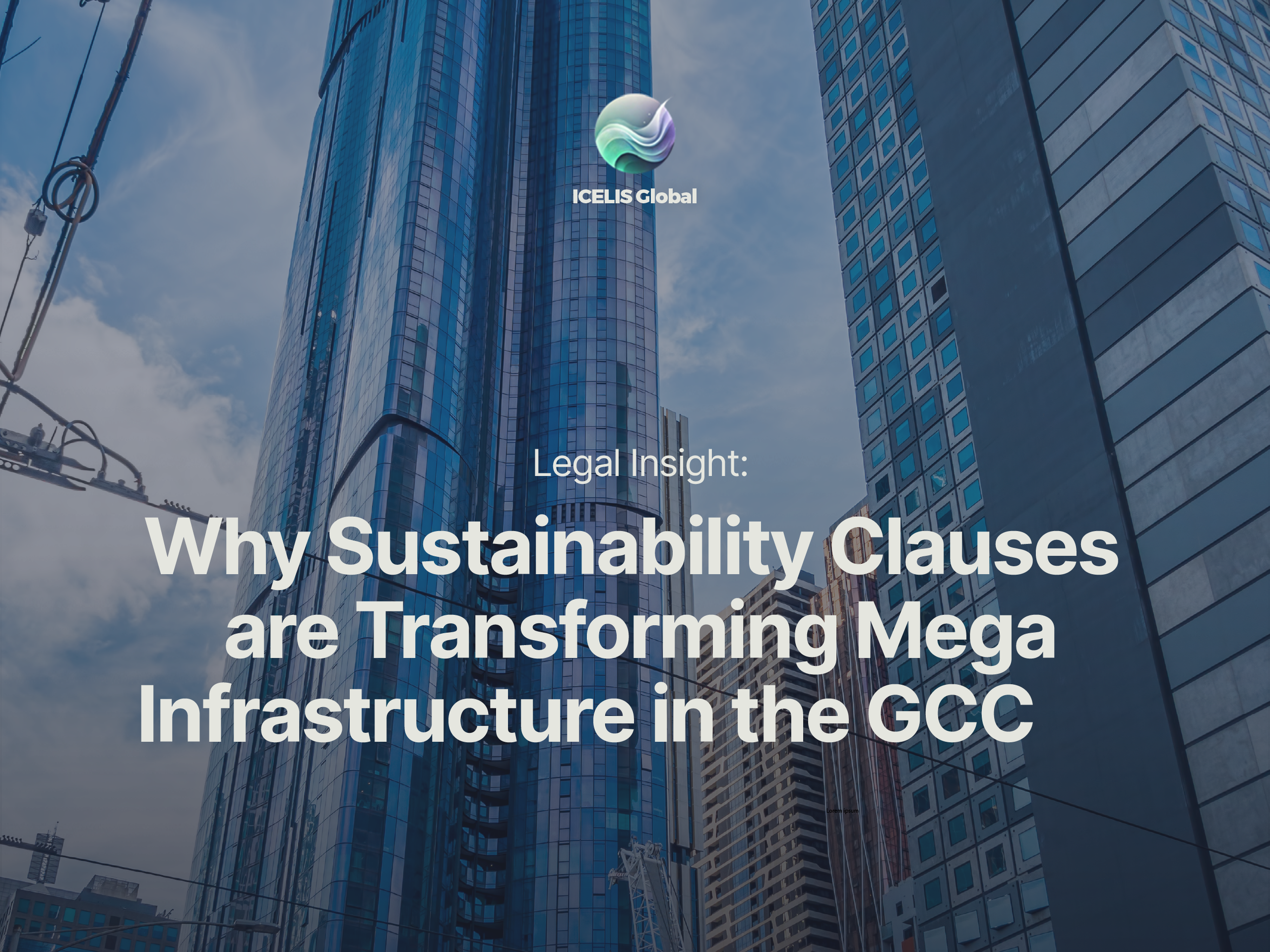Introduction to Sustainability Clauses
Sustainability clauses are rapidly becoming a core component of mega infrastructure contracts across the Gulf Cooperation Council (GCC). Embedded in Engineering, Procurement, and Construction (EPC) as well as Public-Private Partnership (PPP) contracts, these clauses legally bind contractors to meet specific environmental, social, and governance (ESG) benchmarks. Typically defined as Key Performance Indicators (KPIs), these benchmarks help ensure that infrastructure development aligns with national sustainability ambitions, like Saudi Arabia’s Vision 2030 or the UAE’s Net Zero by 2050 initiative.
Such clauses serve not just as contractual obligations but as policy instruments to attract green finance, comply with international ESG standards, and mitigate climate risk. The focus on quantifiable KPIs provides measurable criteria against which the success and compliance of infrastructure projects can be evaluated.
Context of Mega Infrastructure Projects in the GCC
GCC countries are aggressively diversifying their economies beyond hydrocarbons by investing in multi-billion-dollar infrastructure ventures. These include energy transformation initiatives like hydrogen production and solar megaprojects, cross-border high-speed railways, smart airports, deep-sea ports, and entirely new urban ecosystems such as Saudi Arabia’s NEOM and Qatar’s Lusail.
To future-proof these investments, governments are embedding sustainability clauses into contract templates and procurement guidelines. These clauses are no longer optional or cosmetic. They are essential to gaining project approval, investor confidence, and long-term operating licenses. Moreover, these requirements are reinforced by national strategies aligned with international agreements, such as the Paris Agreement and ESG indices.
Energy Sector (EPC, PPP Contracts)
In the energy sector, particularly in renewable energy and clean technology facilities, sustainability clauses cover a broad range of environmental obligations. Commonly stipulated elements include:
- Carbon intensity thresholds: Projects must limit their emissions per unit of energy produced, ensuring alignment with national decarbonization targets.
- Waste management plans: Contracts often mandate the segregation, recycling, and responsible disposal of industrial and hazardous waste.
- Biodiversity conservation: Developers are required to assess and mitigate ecological impacts, especially in remote or ecologically sensitive zones.
These stipulations are typically paired with rigorous reporting and third-party audits to ensure compliance throughout the project lifecycle.
Transport Sector
Sustainability clauses in transport megaprojects, such as GCC rail networks, airport expansions, and logistics hubs, address both environmental and community concerns. Key KPIs include:
- Energy efficiency: The use of energy-efficient systems in railways, airport terminals, and port operations.
- Noise and emissions control: Restrictions on decibel levels, emissions from vehicles, and air quality monitoring.
- Water conservation: Requirements for reduced water usage and greywater recycling.
- Community engagement: Contractors must engage with affected communities and provide local employment or social development programs.
Transport PPPs often allocate bonus incentives for exceeding these KPIs, encouraging innovation in design and operations.
Real Estate & Urban Development
In the GCC’s visionary real estate projects like NEOM and Lusail, sustainability clauses go beyond environmental preservation to influence city planning and urban design. These include:
- Green building standards: Mandatory LEED or equivalent certifications.
- Green space allocation: Clauses requiring developers to allocate a fixed percentage of land to parks or urban forests.
- Renewable integration: Use of solar panels, district cooling systems, and smart grid solutions.
- Water and waste recycling: On-site water treatment and solid waste recycling targets are often written into the contract.
Such clauses aim to embed sustainability into the DNA of future cities, making them resilient, livable, and climate-adaptive.
Key Sustainability KPIs in EPC & PPP Contracts
The KPIs embedded in sustainability clauses typically span three dimensions:
- Environmental: Emissions reduction, water conservation, energy use, waste diversion.
- Social: Local hiring targets, worker welfare, health and safety standards.
- Governance: Transparency in reporting, ethical sourcing, anti-corruption compliance.
Each KPI must be SMART—specific, measurable, achievable, relevant, and time-bound—to facilitate enforcement and evaluation.
Enforcement Mechanisms for Sustainability Clauses
A clause is only as effective as its enforcement. GCC contracts increasingly include:
- Regular reporting obligations: Monthly or quarterly ESG performance reports.
- Third-party verification: Independent consultants or auditors validate reported KPIs.
- Financial consequences: Penalties for underperformance or breaches, and rewards for overachievement.
- Digital monitoring tools: AI and IoT-enabled platforms track compliance in real time.
This structured enforcement ecosystem ensures contractors stay accountable while promoting continuous improvement.
Dispute Resolution and Challenges
Despite the progress, challenges remain. Common issues include:
- Ambiguity in KPI definitions: Vague language can lead to inconsistent interpretation.
- Capacity gaps: Local regulators and contractors may lack the tools or expertise for enforcement.
- International arbitration: Disputes involving foreign contractors often fall under complex investor-state dispute frameworks, making resolution costly and prolonged.
Strengthening legal drafting and building local ESG enforcement capacity will be key to overcoming these challenges.
Conclusion
Sustainability clauses are redefining the GCC’s infrastructure paradigm, marrying economic ambition with environmental responsibility. They help attract ESG-conscious investors, protect natural and human resources, and position the region as a global hub for sustainable development.
However, their long-term success hinges on legal clarity, robust monitoring, and efficient dispute resolution mechanisms. Standardized KPI frameworks, sector-specific model contracts, mediation mechanisms, and enhance monitoring capacity through digital tools.
